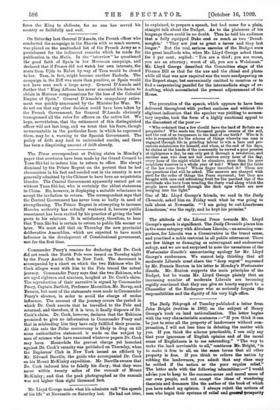The peroration of the speech, which appears to have been
delivered throughout with perfect coolness and without the slightest indication that the speaker was yielding to momen- tary impulse, took the form of a highly emotional appeal to the discontent of the poor:— "Who ordained that a few should have the land of Britain as a perquisite? Who made ten thousand people owners of the soil, and the rest of us trespassers in the land of our birth ? Who is it who issible for the scheme of things whereby one man is engagetrienough life in grinding labour to win a bare and pre- carious subsistence for himself, and when, at the end of his days, he claims at the hands of the community he served a poor pension of eightpence a day, he can only get it through a revolution, and another man who does not toil receives every hour of the day, every hour of the night whilst he slumbers, more than his poor neighbour receives in a whole year of toil ? Where did the table of the law come from? Whose finger inscribed it ? These are the questions that will be asked. The answers are charged with peril for the order of things the Peers represent; but they are fraught with rare and refreshing fruit for the parched lips of the multitude who have been treading the dusty road along which the people have marched through the dark ages which are now merging into the light."
One of Mr. Lloyd George's friends, we read in the Daily Chronicle, asked him on Friday week what he was going to talk about at Newcastle. "' I am going to out-Limehouse Limehouse,' was the reply, and he kept his promise."














































 Previous page
Previous page